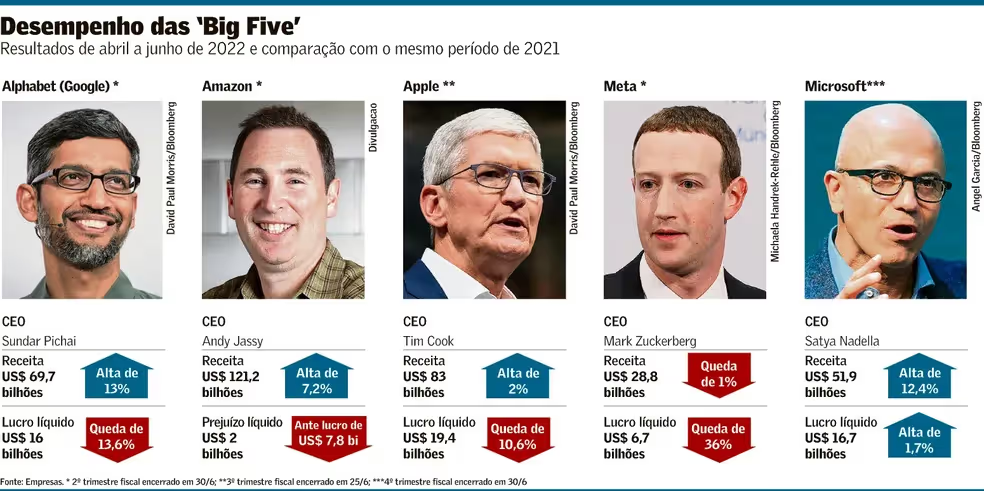Big techs: what they are, how they work and importance
As Big Techs — as large technology companies are called — have become omnipresent and influential figures in the business world and beyond, shaping the way we communicate, consume information, do business, and even how we entertain ourselves.
With a unique ability to collect and analyze data, develop innovations, and provide services that touch virtually every aspect of our lives, Big Techs have challenged the boundaries of corporate influence and raised critical questions about privacy, economic power, government regulation, and social responsibility.
The pandemic also contributed to accelerating the digitalization of this sector and was also one of the drivers behind the advancement of these successful companies. According to the study Flavors of Fast, from the technology company FIS, bigtech revenue grew 17% between 2019 and 2020, while the market capitalization of these companies increased 57% in the period.
In this text, we will explore the impact of Big Techs in society and in the business world, as well as the challenges and opportunities they represent in an increasingly interconnected and digital world.
After all, what are big techs?
By definition, the term Big Tech it is adopted to classify large, technologically based companies that dominate the market and achieve absolute success in the segment in which they operate.
In most cases, these companies started out as startups with revolutionary solutions that served as the key to making your business scalable. This company format seeks ways to transform people's daily lives through innovative services.
Becoming essential is synonymous with Big Techs, so they must constantly adhere to new technologies and services to remain relevant in the market. Because they are companies that facilitate daily life, they play an important role in today's society and their participation in our routine is so common that we don't even realize that we depend directly on them.
How do big techs work?
As Big Techs operate in a wide range of industries and offer a variety of services, but there are some key principles that help you understand how these companies work:
Data collection and analysis
As Big Techs are known for collecting large volumes of data about their users, whether through web searches, interactions on social networks, online purchases, connected devices, or other sources. This data is then processed and analyzed to understand user behavior, identify trends, and offer personalized recommendations.
Diversified business models
Muchas Big Techs adopted diversified business models, with various sources of revenue. This may include advertising (such as the Google and Facebook business model), device sales (such as Apple), subscription services (such as Amazon Prime and Microsoft 365), and e-commerce (such as Amazon). This diversification helps ensure financial stability and continued growth.
Constant innovation
As Big Techs invest heavily in research and development, seeking innovations in hardware, software and services. They seek to create products and solutions that are at the forefront of technology, often shaping trends and setting new industry standards.
Global scalability
The ability to scale globally is a distinctive feature of Big Techs. They have the infrastructure and reach to make their products and services available on a global scale, allowing them to reach billions of users around the planet.
Advantages and disadvantages of big techs
Among the advantages of Big Techs, we can highlight, in particular, the constant development of products, services and solutions that seek to improve daily life and boost technological progress.
After all, the platforms and services offered by these companies often make life more convenient: online shopping, streaming services, search systems, entertainment... the list goes on.
As Big Techs they also have the ability to make their products and services available on a global scale, ensuring that people around the world have access to cutting-edge technology.
In addition, they create digital marketplaces that enable small businesses and entrepreneurs to reach a global audience, helping to boost e-commerce and the digital economy.
Disadvantages
Meanwhile, when we think about disadvantages, we can mention the monopoly and market power of this type of company, since the dominant position of some Big Techs in their markets may limit competition. This may raise concerns about abuse of power and anti-competitive practices.
This type of power also comes to light when we think about the influence of Big Techs about politics and the dissemination of information, and concerns may arise about disinformation and manipulation of public opinion.
In addition, data privacy is also a point to pay attention to when we talk about Big Techs. After all, these companies collect large amounts of user data, raising significant concerns about privacy and the misuse of that information.
The 5 biggest big techs in the world (Big Five)
The “Big Five” or “GAFAM” are a group of five of the largest and most influential technology companies in the world. These giant corporations, which include names like Amazon, Apple, Google, Meta, and Microsoft, play a fundamental role in the global economy and technological evolution. Such companies already control around 80% of the market.

Google (Alphabet)
Originally, this company was created to support and manage all services related to Google, which is the largest search engine in the world. Google is one of the most well-known and powerful companies in the world, specializing in web search, online advertising, cloud services, mobile operating systems, and many other products and services.
Essa Big Tech has been a pioneer in mechanisms such as Chrome, Android, YouTube, Google Home and Google Pix, bringing its global market share to 92.19% in 2019 and generating a total revenue of $162 billion, and of $34.3 billion as net revenue.
Amazon
In the e-commerce niche, this is the largest company in the world, its products and services involve streaming, e-books, smart home solutions, a film and television studio, electronics manufacturing, and more.
The large portfolio of products and services allowed the company to reach total revenues of US$281 billion in 2019, and is also responsible for 33% of the global cloud computing market and 39% of e-commerce sales in the United States.
GOAL
Company founded by Mark Zuckerberg, originally called Facebook, was born from a university project and later became a startup which is currently considered a multi-billion dollar platform. Today, Facebook is just a part of Meta Platforms, a leading social media and virtual reality technology company.
Its expansion into other technologies was due to some acquisitions, such as the purchase of Instagram in March 2012 for US$ 1 billion, WhatsApp in February 2014 for US$ 19 billion, Go glasses in March 2014 for US$ 400 million.
All these acquisitions were to increase its range of services, through obtaining a virtual reality system, improving the algorithm, and developing AI and machine learning, were a positive effort for the company to guarantee its future.
Apple
When it comes to technology companies, Apple is a leader in innovation and is the largest company providing products and services with a focus on unique products.
This company was founded in 1979 by Steve Jobs and Steve Wozniak and has services and products such as Apple Music, iPhone, iPad, MacBook, Apple TV+, and iCloud. The demand for Apple is so great that, in 2019, the company had a total revenue of US$ 260 billion, with US$ 55.2 billion as net revenue.
Microsoft
Although it was founded in 1975 by Bill Gates and Paul Allen, it wasn't until 1983 that it became one of the technology giants. Today, Microsoft is a software and technology services company that offers a wide range of products, including the Windows operating system, the Office suite, the cloud computing service Azure, and the social network LinkedIn.
In 2020, Microsoft had a total revenue of $143 billion in 2020, raising its score and achieving fourth position in the ranking among the largest technology companies in the world, second only to Apple, Amazon and Alphabet.
How did the big techs come about?
As Big Techs have origins that go back to past decades, with some of the most prominent names emerging from the 1970s. Microsoft, for example, was founded in 1975, while Apple appeared in 1976. Google, which later became part of Alphabet Inc. in 2015, was founded in the year 1998. Another giant, initially known as Facebook in 2004, evolved into Meta.
One of the crucial strategies that these companies employed to consolidate their presence in the market was the acquisition of smaller companies in the same sector. These acquisitions allowed the Big Techs expand their influence in various fields and quickly become leaders in their respective fields. Among the companies mentioned, for example, Apple had already been involved in acquisitions since the 1980s.
Although technology companies existed for a long time, the term”Big Tech“gained greater attention starting in 2013 to describe those companies with a dominant presence in the international market.
Importance of big techs in today's society
As Big Techs they influence several areas in our society. First, they lead the way in technological innovation, driving the development of new products and services that directly affect people's lives. Whether developing new devices, such as smartphones and voice assistants, or creating video and music streaming services, these companies are constantly innovating and shaping the technological landscape.
In the economic context, these companies drive the digital economy. They facilitate e-commerce, online marketing, and cloud computing, creating business and employment opportunities around the world.
In addition, search platforms and social networks provide access to a vast amount of information, empowering people to seek knowledge, make informed decisions, and keep up to date on global events.
In education, these companies provide online educational tools and resources, allowing for distance learning and making knowledge more accessible to a global audience.
In the entertainment and culture sector, Big Techs play an important role in the dissemination of music, movies, videos, and creative content. They connect artists with global audiences, offering a variety of entertainment options.
In addition, the Big Techs connect the world, allowing people in different parts of the globe to communicate, share information, and access resources quickly and efficiently. Its platforms and services play a fundamental role in global interconnection.
What is the difference between startups and big techs?
Startups and Big Techs they are two distinct categories of technology companies, differing in several ways, including size, maturity, business model, and reach.
Startups are newly created organizations, often in the early stages of development, characterized by having a limited number of employees and modest financial resources. They generally seek rapid growth and are constantly looking for investors to finance their operations. On the other hand, the Big Techs are established technology companies with a solid history of operations and a global presence. They employ thousands of people and generate substantial revenues.
Startups are often looking for scalable and innovative business models. They may operate at a loss for a while, as the main focus is on conquering the market and attracting investors. In contrast, the Big Techs have diversified business models, encompassing advertising, e-commerce, cloud services, hardware, software, and more. Generally, these companies are profitable and financially stable.
In terms of reach and scale, startups generally have a limited reach and operate on a regional, national or, at best, a limited global scale. On the other hand, the Big Techs they have a massive global reach, serving billions of users around the world with their products and services.
Another distinction between startups and Big Techs are the financial resources of each type of company. Startups have limited financial resources and often rely on investors, such as venture capital, to finance their growth. As Big Techs, on the other hand, have substantial financial resources and frequently invest in research, development, and acquisitions to continue expanding their operations.
Finally, regulations and regulatory scrutiny are more stringent for Big Techs due to their size, influence, and global impact, while startups generally face less regulation and scrutiny due to their lower visibility.
Big techs in Brazil
As Big Techs they have a global presence that also extends to Brazil, playing a prominent role in the country's technological scene. Many of these large global companies established operations in Brazil during the early 2000s, in a period that coincided with the country's economic opening and a significant influx of foreign direct investment. A notable example is Google, which opened its office in Brazil in 2005, followed by Facebook, establishing its presence in the country six years later.
Although Brazil has its own technology companies that have been operating in the market for a long time and offer a diversified range of services, including mobile telephony, television, hosting, and internet, these have not yet reached the same scale of inclusion in the global economy as Big Techs that we mentioned earlier.
In the Brazilian scenario, the regulation of the activities of technology companies is addressed through specific laws. Some of these laws focus on protecting user data, addressing issues related to privacy and digital security. Two important laws in this context are the Marco Civil da Internet and the General Personal Data Protection Act (LGPD).
These laws play a crucial role in defining rules and guidelines for the activities of technology companies in the national territory, aimed at ensuring the safety and privacy of users and establishing compliance and accountability mechanisms.
Big techs and electronic signature
Companies such as Big Techs are known for their constant search for technologies that can improve their processes and boost efficiency in their business. Among these technologies is electronic signature, which stands out as a valuable solution in the daily lives of companies.
For agile and innovative companies, business agility is essential — and electronic signatures allow companies to act quickly, accelerating the conclusion of agreements, contracts, and transactions.
In addition, most of the Big Techs already uses a variety of technological tools and platforms in its operations. In this context, electronic signatures can be easily integrated with these solutions, making it a natural extension of your workflows.
From a security standpoint, electronic signature solutions, such as those from Clicksign, offer high levels of authenticity and traceability. This ensures that electronically signed documents are as valid and reliable as their paper equivalents.
In addition, electronic signatures are easily scalable, meeting the needs of growing companies. This makes it a practical choice for Big Techs, which often experience rapid growth.
Do like the Big Techs and create a digital future for your business! Understand how Clicksign's electronic signature solutions can help your business. Try free for 14 days!











